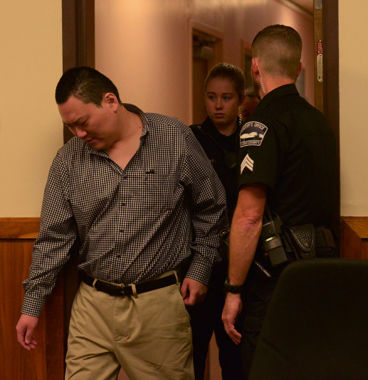Life sentence for Moscow shooting spree

John Lee at his sentencing in May, where the judge gave him life in prison for the murders of three people.
May 25, 2016
After three hours in Latah County Second District Court, John Lee stood before the families and friends of his victims on Tuesday to receive his sentence for the murder of three people during a shooting spree which shocked Moscow in January 2015.
Judge John R. Stegner gave Lee life in prison without the possibility of parole for three charges of first-degree murder, as well as 15 years for an aggravated assault charge. He struggled to find words for the horror of Lee’s actions.
“The English language doesn’t have enough adjectives to describe what transpired on January 10, 2015,” he said.
What transpired were the murders of David Trail, 76, Lee’s landlord, Belinda Niebuhr, 47, an Arby’s manager with whom Lee does not seem to have had a connection, and Terri Grzebielski, 61, Lee’s adoptive mother.
“I believe in God and I believe you’re going to hell.”
Theresa Miller, sister of Belinda Niebuhr
The spree began when Lee killed Grzebielski in her home before driving to Trail’s office, killing him and injuring Michael Chin, 39, with whom Trail was meeting.
Immediately after, Lee drove to Arby’s where he asked for the manager. When Niebuhr approached he began to fire, pursuing and shooting her as she dived through the drive-thru window in an escape attempt.
Police located Lee in Pullman and engaged in a high-speed chase with him until he rolled his car. During a search they found the murder weapon, as well as an assault rifle.
“Where was he going?” prosecutor Bill Thompson wondered. “He was headed west. He was fully loaded.”
The sentence followed a lengthy debate on the mitigating nature of Lee’s mental condition.
“We will not ever know how to predict who is subject to his thoughts. We certainly couldn’t in this case.”
Bill Thompson, prosecutor
Defense attorney Charles Covis argued Lee, who has been diagnosed with schizophrenia and Asperger’s syndrome, should be hospitalized rather than incarcerated for life. He criticized the state of mental health care in Idaho, particularly in criminal cases.
“There’s all kinds of help after the fact,” he said, “and none before.”
Though the prosecutors acknowledged his illness, they said this does not warrant a lower penalty and can be treated in an institution.
Two psychologists have said Lee is not a general threat to the public, but they cannot know who will become incorporated into his delusions, putting them at risk.
“We will not ever know how to predict who is subject to his thoughts,” Thompson said. “We certainly couldn’t in this case.”
A number of surviving relatives of the victims took the stand during the hearing to express the pain brought about by Lee’s actions.
“I don’t go outside no more,” said Michael Black, Niebuhr’s brother. “I don’t trust people no more. This has affected me in ways you wouldn’t think of.”
Parents, children and siblings recalled better times with their loved ones and all said Lee is not deserving of leniency.
“He took happiness from a lot of people,” he said, his voice breaking.


















